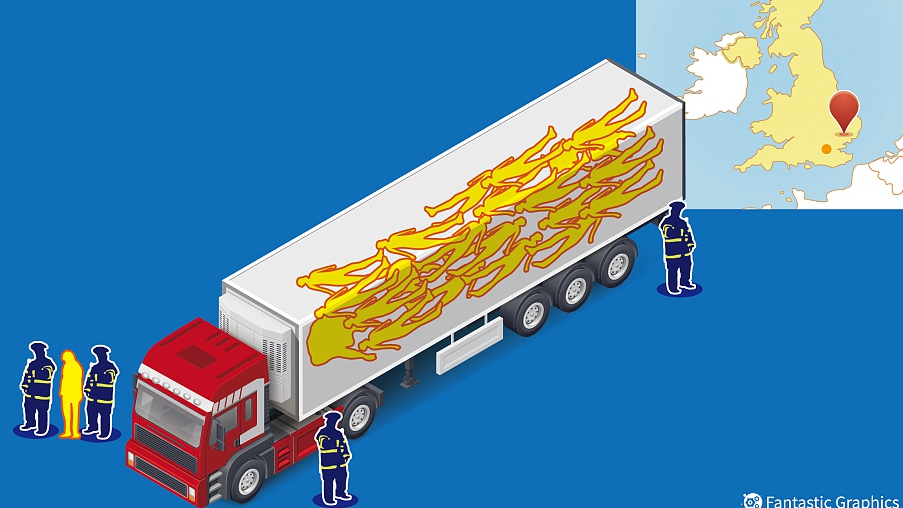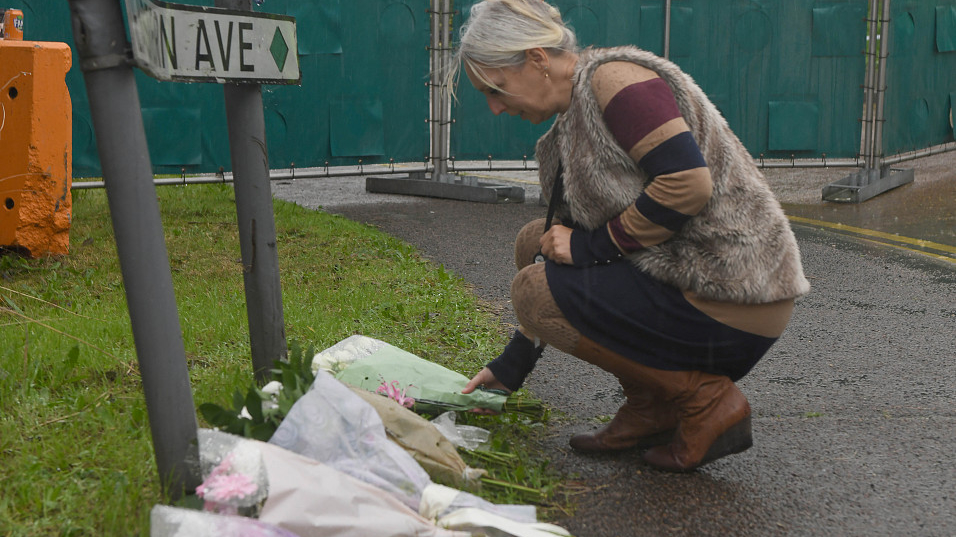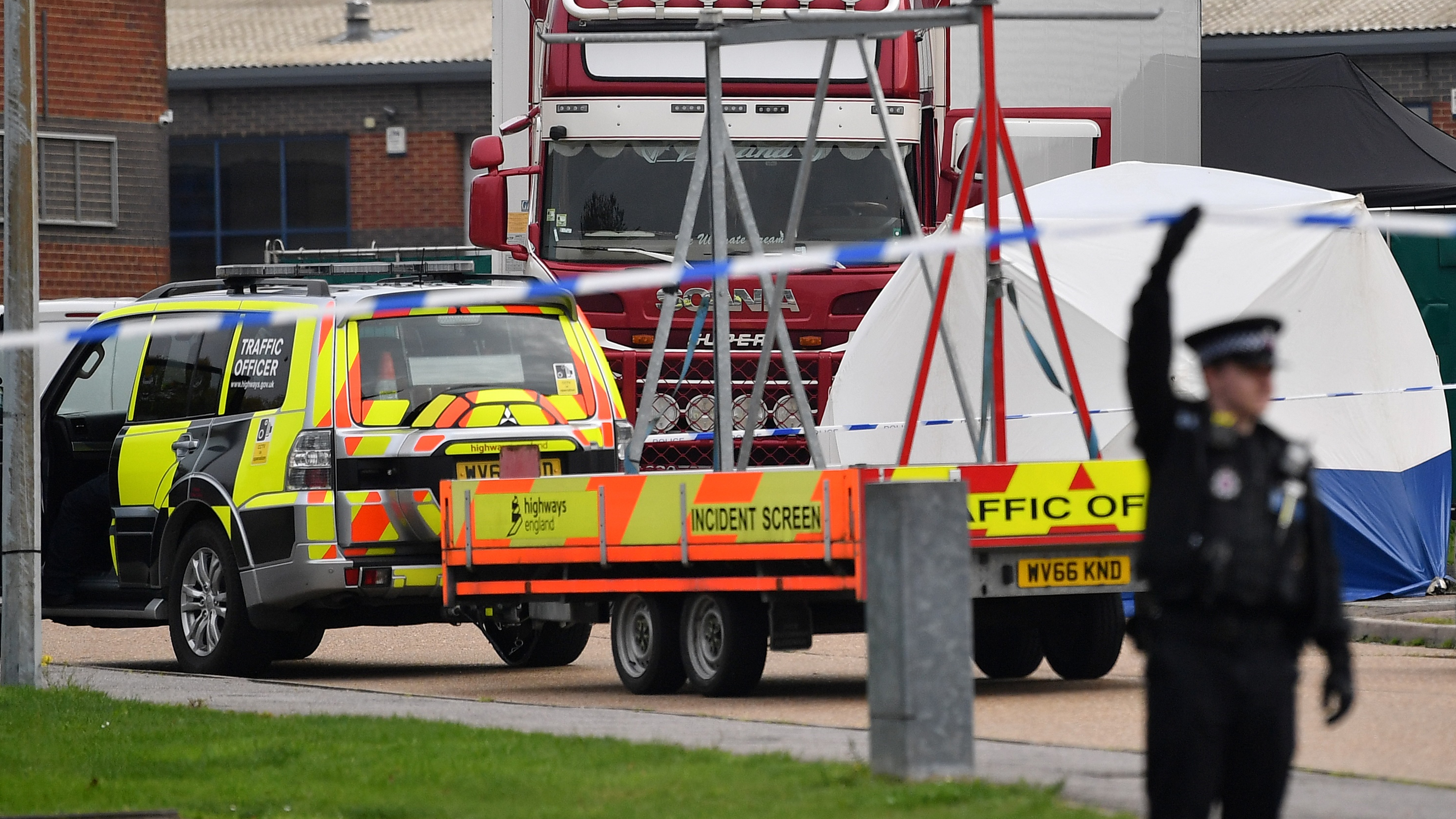
39 people found dead in a trailer in the UK. /VCG Photo
39 people found dead in a trailer in the UK. /VCG Photo
Editor's note: Tom Fowdy is a British political and international relations analyst and a graduate of Durham and Oxford universities. He writes on topics pertaining to China, the DPRK, Britain, and the United States. The article reflects the author's opinions, and not necessarily the views of CGTN.
The world last week was shocked by the news of a truck in the United Kingdom which was found to contain 39 dead bodies. The vehicle, which had entered the country through Belgium, was suspected to be part of a human trafficking network.
Despite the lack of clarity and identity confirmation, the British mainstream media perpetuated a claim that the deceased individuals were all "Chinese nationals" – only for a revelation to emerge later that some of the victims were in fact from Vietnam.

A local resident pays tribute to people who died in a lorry trailer in Essex, the UK, October 24, 2019. /VCG Photo
A local resident pays tribute to people who died in a lorry trailer in Essex, the UK, October 24, 2019. /VCG Photo
As of today, the full identification of each body is yet to be completed.
That however, didn't stop Western commentariats from prematurely using the assumption that the victims were Chinese to score points against the country's political and economic system. One notable Chinese studies professor and journal editor from the UK used the events to mock the idea of "harmonious prosperity" while others tried to point out that the smuggling was a vindication that people wanted to "flee" China, arguing the country still suffers from chronic rural poverty and so on. As the tide turned from China to Vietnam, attacks on the latter in the same light did not follow.
This reveals a broader problem with the Western discourse on China, both in the media and general analysis. Empowered by ideological biases and the religious driven belief that the Western political model represents the "only" way, there is an inevitable motivation among some circles to thoroughly discredit China's achievements and paint it in the most negative light possible, building into a broader pattern of commentary which seeks to emphasize, exaggerate and "predict" the failure of the country's model.
It has been well established that many in the West do not respect China on equal terms. Why is this? Derived from the legacy of Christianity which mandated the preaching of a single "universal way" to the world, modern liberalism continues to replicate its normative assumptions by advocating a singular set of indisputable "political truths" and a moral mission to evangelize these values accordingly.
This Christian foundation thus means that like in days of old, this ontological outlook is derived as "the only way" and therefore, any alternative interpretations must be "untrue" and "morally flawed." Those who possess it are enlightened, truthful and moral; while those who do not possess it are assumed to be evil, in darkness and deceived. They must be "rescued" by the truth of liberalism.
Therefore, over the past 200 years, the West's relationship towards China has been driven by this attitude that the country is a moral mission which must be "shaped" to Western preferences. This has translated into an almost total rejection of Chinese civilization, philosophy and more pressingly a rejection of the idea that the Chinese themselves can possibly disagree with the West on how to govern their country. As above notes, everyone who thinks differently is merely "brainwashed" or "inauthentic."
As a result, this sentiment translates into a wider trend in reporting and commentary which seek to discredit and dismiss China's political and economic system wherever possible; with the prospect of a non-Western state possibly being more successful than the Western model itself essentially rendered a form of heresy and blasphemy. The indisputable, universal truth must be upheld. Thus, many journalists constantly seek to confirm a set of broader biases which place faith in sustaining narratives of its failures and imperfections.
For example, even before the trade war, negative projections of China's economy and theories of a "pending doom" have persisted for years. What better example is there than Gordon Chang's "The Coming Collapse of China" authored in 2001? The fact that Chang continues to get excessive media coverage despite this obvious failure is a sign where priorities lie.

A police cordon has been put in place at the Waterglade Industrial Park in Grays, Essex, the UK. (Credit: AP)
A police cordon has been put in place at the Waterglade Industrial Park in Grays, Essex, the UK. (Credit: AP)
Thus, when the news of a tragedy emerged in the United Kingdom whereby the alleged victims were Chinese, there was a rush within the analytical and commentary circles before the news was even confirmed to wage broader attacks against China's political and economic system in order to sustain the narrative that China's development was not as good as it seemed, which also sought to confirm their broader assumptions that the Chinese people don't really like their government and there is an oppressed "hidden" perspective which wants to absorb the ideology and ways of the West.
Thus as a whole, it is important that we understand the broader ideological and ontological biases that come into play on the discussion of China. There is in Western circles, a pervasive set of beliefs that one truth prevails and that China cannot be "successful" unless it is changed to suit that vision.
Therefore, the idea for China to instead pursue a "different way" must be at all costs discredited and rendered "not true" – thus leading to horrendous levels of confirmation bias in tragedies like this one, before the facts themselves are even divulged.
(If you want to contribute and have specific expertise, please contact us at opinions@cgtn.com.)